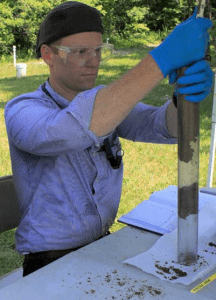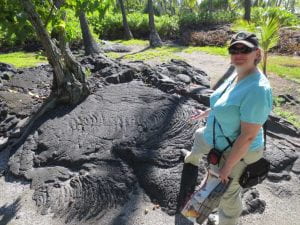Dyanna Czeck
Dyanna Czeck has been a geosciences professor at UWM since 2003. She loves to study rocks that have been deformed during ancient plate collisions. In particular, she enjoys looking at rocks that were squished deep within the earth. When analyzing these rocks, she measures structural features in the field, observes beautiful patterns under the microscope, and employs mathematical models for more rigorous fun. As an undergraduate at the University of Iowa, she was inspired to learn more about the natural environment after enjoying canoe trips in the Boundary Waters and exploring the Lake Superior shoreline in her native Minnesota. She proposed the GO FoRWARD program because she wants everyone to have the opportunity to explore the beauty of the natural world and pursue rewarding careers in geosciences. She is excited to work closely with GO FoRWARD students. When she is not at work, she enjoys traveling, cooking, gardening, listening to all kinds of music, enjoying the outdoors, and spending time with her family.
Darian Dixon
Darian Dixon, a Milwaukee native and Riverside alum, earned a Bachelor’s of Science in geology from UWM in 2015 and then went on to earn a Master’s of Science in geology from Western Washington University in Bellingham, WA in 2018. At WWU Darian became a member of the Mastcam and Mastcam-Z teams for the Curiosity and Perseverance rovers. His research helped mission team members plan the future use of the then in-development Mastcam-Z cameras to detect hydrated minerals on Mars. After his Masters, Darian moved to San Diego where he worked at Malin Space Science Systems (MSSS) as a spacecraft operations engineer. He operated the Mastcam, MAHLI, and MARDI cameras on Curiosity and was Data Management Lead for Mastcam-Z on Perseverance. In his time at MSSS he was responsible for thousands of images taken on the surface of Mars and played a key role in the first videos of the Mars helicopter Ingenuity taking its first ever flights. Darian has now returned home to UWM to begin his PhD. Beyond work, Darian is a father, avid gamer, gardener, sports fan, hip-hop junkie, and speaker/educator that is passionate about diversity and inclusion in STEM.

Tory McCoy
Victoria (Tory) McCoy started at UWM in 2019, and her teaching and research is focused on paleontology. There is nothing Tory finds more interesting than learning more about how extinct animals and plants lived their lives – what habitat did they live in, how did they move around and interact with the world around them, and what did they eat for breakfast. The weirder and more unusual the extinct animal/plant, the better! Tory first started thinking about paleontology when she was 4 years old and took a summer camp about fossils. She was fascinated by the realization that Earth in the past was full of weird and wonderful creatures, and in some ways, the ancient Earth was as much an alien planet as anything portrayed in science fiction. Ever since then, she was hooked, and she has always been interested in sharing her passion for paleontology with students.

Charlie Paradis
Charlie Paradis joined UWM in 2019 and focuses on teaching and research on contaminated groundwater; nearly 3/4 of Wisconsinites rely on clean groundwater for drinking! He is shown in this picture conducting visual and manual characterization of soils and sediments from a uranium-contaminated aquifer in Oak Ridge, Tennessee; he did his PhD nearby at UT-Knoxville. Charlie enjoys working in the laboratory and in the field with students with a wide range of abilities and experiences to increase the accessibility to geosciences. Growing up, he was much more interested in sports than science. Once out of high school, he worked as a commercial truck driver for two years, before he was sidelined by a physical health issue. It was then he decided that he needed to pursue a career which required a higher education and soon found a friendly home in the geosciences!


